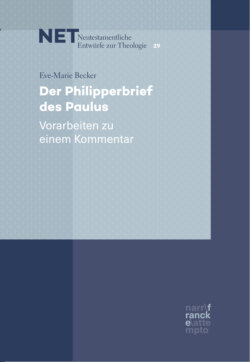Читать книгу Der Philipperbrief des Paulus - Eve-Marie Becker - Страница 14
На сайте Литреса книга снята с продажи.
3. Some conclusions for the interpretation of Paul’s letter to the Philippians
ОглавлениеActs 2005Apg20 and Paul’s letter to the Philippians share a lot of semantics and motifs. Luke probably used Philippians when composing the farewellAbschiedsrede(n) speech in ch. 20. Could, however, Luke’s reception of Philippians also illuminate our understanding of the letter – could the phenomenon of intertextuality lead to mutual illuminations of both texts (without necessarily playing themselves out in a kind of a circular argument)? Luke’s supposed reception of Philippians can reveal some intriguing insights, not only into Luke’s compositional technique but also into the early history of reading and interpreting Philippians. Let me conclude with some brief reflections.
(a) As pointed out earlier, Luke does not and cannot see himself limited to sources such as Paul’s letters, for instance the letter to the Philippians, when composing a speech or a farewellAbschiedsrede(n) scene. He has to consider other sources of information as well (s. above). His interpretive task is to combine and reconcile diverse, partly divergent types of sources and to satisfy his reading audience. This view on Luke might shed interesting light on the (authoritative) status of Pauline epistolography (Philippians included) in the end of the 1st century.
(b) In light of Acts 2005Apg20:105Apg20,18ff.05Apg20,18ff., Paul’s letter to the Philippians seems to be perceived by Luke as a farewellAbschiedsrede(n) discourse since the historian draws on it to a remarkable extent. The debate about Philippians’s literary genre and rhetorical purpose (see J. ReumannReumann, John) might be enriched by comparing Philippians to Acts 20:18ff.05Apg20,18ff. and by observing how the letter was read and interpreted by Luke.
(c) Having said this, we will also have to make crucial distinctions between both texts. Even though Acts 2005Apg20:105Apg20,18ff.05Apg20,18ff. and Philippians are close in terms of semantics and motifs, and even though both texts might share conceptual features of ancient farewellAbschiedsrede(n) discourse literature, significant differences come to light: first, Acts 20:18ff.05Apg20,18ff. contains a farewell speech, which is pretty close to farewell discourses which we know from the Jewish world (s. above), while Philippians entails consoling motifs also, which rather derive from consoling literature of the Greco-Roman world.1 Second, Luke’s overall purpose of presenting Paul in ch. 20 is apologetic; in his letter-writing to the Philippians, in contrast, Paul intends to implement mimetic ethics. Third, while the epistolary setting has an ethical purpose in Philippians, it widely serves an apologetic purpose in Acts 20:18ff.05Apg20,18ff. Luke transforms the ethical teacher Paul, whom he finds in Philippians, and Paul’s legacy therein, into the paradigm of a Christ-believing witness who practices apologiaἀπολογία, apologia.ἀπολογία, apologiaSelbst, self, selfhood2 As such a paradigm of an “apologist,” the Lukan Paul finally appears as a moral example: accordingly, the reader might understand in a new way, and indeed different to Phil 2:3, what ταπεινοφροσύνη and παρρησία are about.
(d) In his perception of Philippians, Luke sees himself no longer bound to address any specific congregation: In Acts 2005Apg20 he rather remodels early Christian topography in a quite complex way (MacedoniaMakedonien/Macedonia, EphesusEphesus, MiletusMilet(us)). Luke is obviously less interested in documenting or recording precisely any (written) communication of Paul with particular communities in Asia Minor or Macedonia. Rather, the historian wants to show Paul according to Luke’s own geographical concept: as an orator to the public who will be an ultimate martyr; only because he is forced to selfSelbst, self, selfhood-defense, he will reach Rome and thus finally complete the global missionary strategy.
(e) The book of Acts as a whole and Paul’s letter to the Philippians share a certain affiliation to the city of Rome: in Acts, Luke sends his most prestigious figure – Paul – finally to the caput mundi; in Philippians Paul seems to be in Roman captivity (Phil 1:12ff.; 4:22). How is “Rome” anticipated in both texts? To Luke, Rome is a place of expectation and hope. Here, Paul – a Roman citizen – might receive fair treatment; here, Paul can preach the βασιλεία even in παρρησία and without any hindrance (in contrast to all the obstacles he had to face in his earlier career, especially in Asia Minor). To Paul the letter-writer, the city of Rome – even though it is not explicitly mentioned in Philippians – is a place where a final decision will be made about his personal fortune. As a prisoner the apostle anticipates his sentence of death.
In that Luke transforms, reproduces, or “manipulates” Paul’s letter to the Philippians in Acts 2005Apg20:105Apg20,18ff.05Apg20,18ff. – a letter being written amidst Paul’s anticipation of his impending death – into a proleptic announcement of his pending leave, the historian finally also crucially remodels the image of Rome and the nature of Paul’s farewellAbschiedsrede(n): first, instead of becoming an estimated place of death in the near future (as indicated in Philippians), Rome is seen by Luke as a promising, if not successful center of coming preaching activities. Second, while Paul in Philippians shapes in effectu a kind of ultima verba which he uses for the purpose of ethical instruction, Luke makes Paul’s farewell in Acts 20:18ff.05Apg20,18ff. to be a topographical incident: indeed, Paul’s farewell is about his leave from known areas to unknown places like Rome, where the goal of finally “witnessing” globally (e.g., Acts 23:1105Apg23,11; see 1:805Apg01,8; 9:15-1605Apg09,15-16) is reached.
